西洋哲学史の流れとは?古代から現代まで、わかりやすく解説します!11

レオンハルト・オイラー(1707年4月15日 – 1783年9月18日)
Leonhard Euler (April 15, 1707 – September 18, 1783)
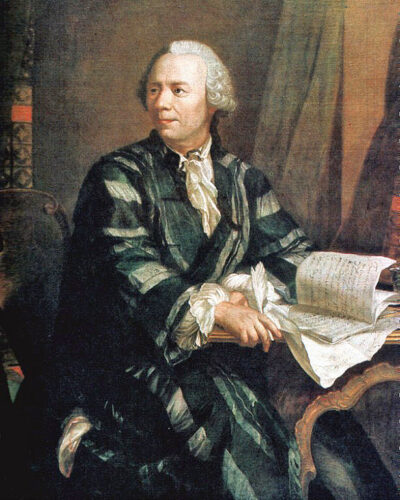
Leonhard Euler
生い立ち・生涯
レオンハルト・オイラー:数学の巨星の生涯
生い立ちと教育
レオンハルト・オイラーは、1707年4月15日にスイスのバーゼルで生まれました。
教育を重んじる家庭に育ち、幼い頃から数学の才能を示しました。
父親は最初、レオンハルトに牧師の道を進むことを望んでいましたが、息子の数学への情熱がそれを変えました。
わずか13歳でバーゼル大学に入学し、名だたる数学者ヨハン・ベルヌーイの指導を受けました。
学問の道
オイラーの学問の道は驚異的なものでした。
20歳の時に修士号を取得し、数学の論文を発表し始めました。
彼の画期的な研究はヨーロッパ中の学者の注目を集め、数学における素晴らしいキャリアの道を開きました。
数学への貢献
彼の一生を通じて、オイラーは数学のさまざまな分野に数々の貢献をしました。
微積分学、数論、幾何学などの分野での彼の業績は、これらの分野を革新しました。
彼の論文や書籍は850以上にも及び、微分方程式、数論、天体力学など多岐にわたります。
オイラーの公式
オイラーの最も有名な発見の一つは、複素数、指数関数、三角関数を結ぶ公式です:( e^{i\pi} + 1 = 0 )。
この優雅な方程式はオイラーの同一性として知られ、数学の概念の統一性に対する深い洞察力で称賛されています。
後半生と遺産
1741年にフリードリヒ大王の招きでベルリン科学アカデミーに加わったオイラーは、ベルリンでの時間を新世代の数学者の指導に費やしながら、画期的な研究を続けました。
後年、失明した彼は息子たちに自分の考えを口述しました。
1766年にロシアに戻ったオイラーは、残りの人生をサンクトペテルブルク科学アカデミーで過ごしました。
彼は1783年9月18日に亡くなりましたが、その遺産は世界中の数学者や科学者に今も影響を与え続けています。
結び
レオンハルト・オイラーの生涯と業績は、知的好奇心と革新の精神を象徴しています。
彼の数学への貢献は、私たちが世界を理解する方法を形作る上で不可欠なものとなっています。
オイラーの遺産は、人類の知性の力と知識の永遠の追求を証明しています。
Life and Legacy
Leonhard Euler: The Life of a Mathematical Giant
Early Life and Education
Leonhard Euler was born on April 15, 1707, in Basel, Switzerland, into a family that valued education. Showing an early talent for mathematics, Euler’s father initially hoped he would become a pastor, but his son’s passion for mathematics changed his mind. At just 13 years old, Euler entered the University of Basel, where he received guidance from the renowned mathematician Johann Bernoulli.
Academic Journey
Euler’s academic journey was nothing short of remarkable. By the age of 20, he obtained his master’s degree and began publishing papers on mathematics. His groundbreaking research attracted the attention of scholars across Europe, paving the way for a stellar career in mathematics.
Contributions to Mathematics
Throughout his life, Euler made numerous contributions to various fields of mathematics. His achievements in areas such as calculus, number theory, and geometry revolutionized these fields. His papers and books numbered over 850, covering a wide range of topics including differential equations, number theory, and celestial mechanics.
Euler’s Formula
One of Euler’s most famous discoveries is his formula connecting complex numbers, exponential functions, and trigonometric functions: ( e^{i\pi} + 1 = 0 ). This elegant equation, known as Euler’s identity, is praised for its deep insight into the unity of mathematical concepts.
Later Life and Legacy
Joining the Berlin Academy of Sciences at the invitation of Frederick the Great in 1741, Euler spent his time in Berlin continuing groundbreaking research while mentoring the next generation of mathematicians. In his later years, despite being blind, he dictated his thoughts to his sons.
Returning to Russia in 1766, Euler spent the rest of his life at the St. Petersburg Academy of Sciences. He passed away on September 18, 1783, but his legacy continues to influence mathematicians and scientists worldwide.
Conclusion
The life and achievements of Leonhard Euler symbolize intellectual curiosity and the spirit of innovation. His contributions to mathematics have been essential in shaping how we understand the world. Euler’s legacy stands as a testament to the power of human intellect and the eternal pursuit of knowledge.
哲学・思想
レオンハルト・オイラー(Leonhard Euler)は、18世紀の数学者、物理学者、そして哲学者でした。
彼の業績は、その時代の数学と物理学の進歩において驚異的なものでしたが、彼の哲学的な見解も同様に注目に値します。
数学と物理学の領域での貢献は多岐にわたり、特に微積分学、解析学、力学、そして数論の分野において革新的なアイデアを提供しました。
しかし、彼の思想は、彼の数学的な研究以上に広範囲で議論されることがあります。
オイラーの哲学は、彼の数学的研究の裏にある深い信念や原理に根ざしています。
彼は数学の研究を通じて、神や宗教、そして人間の存在に関する考察を行いました。
彼は数学の美しさや秩序に感銘を受け、それを神の創造的な意志や宇宙の秩序の反映と見なしました。
また、オイラーは理性と信仰の関係についても考えました。
彼は理性と信仰を対立するものではなく、むしろ相補的なものとして捉え、科学的な発見が信仰と一致することを信じました。
彼は理性の限界を認識しつつも、信仰を通じて超越的な現実へのアクセスを可能とするものとして捉えました。
オイラーはまた、自然法と人間の道徳的な責任についても深く考えました。
彼は自然法を神の法の一部と見なし、人間は神の法に従うことによって最高の善を追求すべきだと考えました。
この考え方は、彼の道徳的な哲学にも影響を与えました。
彼の数学的な研究と同様に、オイラーの哲学的な見解も時代を超えて影響を与え続けています。
彼の信念や原理は、現代の科学と宗教の関係においても興味深い議論の的となっています。
Philosophy
Leonhard Euler was not only an 18th-century mathematician and physicist but also a philosopher. While his contributions to mathematics and physics were remarkable for the advancement of his time, his philosophical insights are equally noteworthy.
His contributions in the fields of mathematics and physics were diverse, providing innovative ideas particularly in calculus, analysis, mechanics, and number theory. However, his philosophical thoughts may sometimes spark broader discussions than his mathematical research.
Euler’s philosophy was rooted in deep beliefs and principles underlying his mathematical inquiries. Through his study of mathematics, he contemplated on matters concerning God, religion, and human existence. He was inspired by the beauty and order of mathematics, viewing them as reflections of God’s creative will and the order of the universe.
Moreover, Euler pondered on the relationship between reason and faith. He saw reason and faith not as opposing forces but rather as complementary, believing that scientific discoveries could align with faith. While recognizing the limitations of reason, he viewed faith as providing access to transcendent reality.
Euler also delved deeply into natural law and human moral responsibility. He regarded natural law as part of God’s law, believing that humans should pursue the highest good by obeying God’s law. This perspective influenced his moral philosophy as well.
Like his mathematical research, Euler’s philosophical insights continue to influence beyond his time. His beliefs and principles remain subjects of intriguing discussions in the contemporary discourse on the relationship between science and religion.
特徴
レオンハルト・オイラーは、18世紀に活躍した数学者、物理学者、そして哲学者であり、その膨大な業績と独創的な思考で知られています。
彼の特徴は多岐にわたりますが、その中でも特に注目される点を見ていきましょう。
数学の巨匠:
オイラーは数学の分野で非凡な才能を発揮しました。
彼の数学的業績は圧倒的であり、解析学、微積分学、数論、代数学、そして幾何学など、幅広い分野にわたります。
彼は数学の基礎を築き、多くの重要な定理や公式を発見しました。
その中でも代表的なものに、オイラーの公式やオイラーの恒等式、そしてオイラーの多角形定理などがあります。
数学的発見の多様性:
オイラーは数学的に非常に多様な領域で活動しました。
彼の業績には、微分積分学の基礎の確立、複素解析学の発展、そして数学記号の導入などが含まれます。
彼はまた、数論においても重要な発見をし、素数定理やフェルマーの最終定理の解決に貢献しました。
物理学への貢献:
オイラーは数学だけでなく、物理学の分野でも重要な貢献をしました。
彼は力学や流体力学、振動、光学などの領域で研究を行い、多くの物理学的問題に新しいアプローチを提供しました。
彼の業績には、オイラーの流体方程式や剛体の運動に関する研究などが含まれます。
哲学的思考:
オイラーは数学者としてだけでなく、哲学者としても深い洞察力を持っていました。
彼は科学と宗教、理性と信仰の関係について考察し、その結果を著作に残しました。
彼の哲学的思考は、彼の数学的研究と密接に結びついており、人間の知性や存在に関する深い洞察を提供しました。
多作な著作:
オイラーは数学や物理学、哲学などの分野で多くの著作を残しました。
彼の論文や書籍は非常に多岐にわたり、その内容は幅広い読者に影響を与えました。
彼の著作は今日でも数学や物理学の学習において重要な参考書として使用されています。
レオンハルト・オイラーの特徴はその豊富な知識と創造性、そして多彩な才能にあります。
彼の業績は数学と科学の発展に大きな影響を与え、その功績は現代においても称賛され続けています。
Characteristics
Leonhard Euler, a mathematician, physicist, and philosopher of the 18th century, is renowned for his vast accomplishments and innovative thinking. Let’s explore some of his notable characteristics.
Mathematical Master:
Euler displayed extraordinary talent in the field of mathematics. His mathematical achievements spanned a wide range, including analysis, calculus, number theory, algebra, and geometry. He laid the foundation of mathematics and discovered many crucial theorems and formulas, such as Euler’s formula, identity, and polygon theorem.
Diversity in Mathematical Discoveries:
Euler engaged in a diverse array of mathematical domains. His contributions encompassed establishing the fundamentals of calculus, advancing complex analysis, and introducing mathematical notation. He made significant discoveries in number theory, contributing to the resolution of prime number theorems and Fermat’s Last Theorem.
Contributions to Physics:
Euler made substantial contributions not only to mathematics but also to the field of physics. He conducted research in mechanics, fluid dynamics, oscillations, and optics, offering new approaches to various physical problems. His achievements include Euler’s fluid equations and studies on rigid body motion.
Philosophical Contemplation:
Euler possessed profound insights not only as a mathematician but also as a philosopher. He contemplated the relationship between science and religion, reason and faith, leaving his reflections in written works. His philosophical thoughts were closely intertwined with his mathematical research, providing deep insights into human intellect and existence.
Prolific Authorship:
Euler left behind numerous works in fields such as mathematics, physics, and philosophy. His papers and books spanned a wide range of topics, influencing readers across diverse audiences. His works continue to serve as essential reference materials for the study of mathematics and physics today.
The characteristics of Leonhard Euler lie in his abundant knowledge, creativity, and versatile talents. His contributions have significantly influenced the advancement of mathematics and science, and his achievements continue to be celebrated in modern times.
エピソード
レオンハルト・オイラー(1707年4月15日 – 1783年9月18日)
レオンハルト・オイラーは、数学者としての優れた業績だけでなく、その生涯には興味深い逸話が数多く残されています。
彼の卓越した才能や独特な性格を示す逸話をいくつか紹介しましょう。
数学に没頭する姿勢:
オイラーは数学に対する情熱に溢れており、その証拠には数々の逸話が残されています。
彼は数学に没頭するあまり、食事を忘れることがよくありました。
ある日、彼が数学の問題に夢中になっていると、突然家族が夕食の用意をしても彼は帰宅せず、結局夜通し数学に没頭してしまったという話が伝えられています。
数学者同士の駆け引き:
オイラーは時には他の数学者との議論や駆け引きにも熱心でした。
彼は同じく優れた数学者であるダニエル・ベルヌーイとの対立がよく知られています。
彼らの間には数学的な問題を巡って激しい論争があり、時には公開討論まで行われたといいます。
しかし、その後もお互いに尊敬し合い、研究の成果を称賛し合う仲となりました。
盲目との交流:
オイラーは晩年、失明によって目が不自由になりましたが、それでも数学への情熱を持ち続けました。
彼は視覚を失った後も、数学的な問題を考え、解決するために手書きのノートや書簡を用いました。
また、彼の親しい友人や同僚も彼の盲目の状態に配慮し、手紙を書いたり口頭で数学の問題を議論したりすることがありました。
皇帝との面会:
オイラーは数学の分野で非凡な才能を示したことから、当時のプロイセン王国のフリードリヒ大王の注目を浴びました。
フリードリヒ大王はオイラーに面会し、彼の数学的な知識や洞察力に感銘を受けました。
この面会はオイラーの人生において特筆すべき出来事の一つとされています。
レオンハルト・オイラーの逸話には彼の数学への情熱や知性、そして人間性が反映されています。
これらの逸話は彼の生涯を彩る興味深いエピソードであり、彼がどのようにして数学界で著名な存在となったのかを垣間見ることができます。
Episodes
Leonhard Euler (April 15, 1707 – September 18, 1783)
Leonhard Euler, known for his outstanding mathematical achievements, also left behind numerous intriguing episodes throughout his life. Let’s explore some anecdotes that illustrate his exceptional talent and unique character.
Dedication to Mathematics:
Euler was filled with a passion for mathematics, as evidenced by several anecdotes. He was so engrossed in mathematics that he often forgot to eat. One day, he was so absorbed in solving a mathematical problem that he forgot to return home for dinner, eventually spending the entire night immersed in mathematics.
Intellectual Sparring Among Mathematicians:
Euler was sometimes deeply engaged in discussions and intellectual sparring with other mathematicians. His famous rivalry with the equally talented mathematician Daniel Bernoulli is well-known. They engaged in heated debates and even public disputes over mathematical problems. However, they ultimately maintained mutual respect, admiring each other’s research achievements.
Interaction Despite Blindness:
In his later years, Euler suffered from blindness due to which he faced visual impairments. However, he continued to pursue his passion for mathematics. Even after losing his sight, he used handwritten notes and letters to contemplate and solve mathematical problems. Additionally, his close friends and colleagues accommodated his blindness, writing letters and engaging in oral discussions about mathematical problems.
Meeting with the Emperor:
Due to his extraordinary talent in mathematics, Euler gained the attention of Frederick the Great, the King of Prussia at that time. Frederick the Great met Euler and was deeply impressed by his mathematical knowledge and insights. This meeting is considered a significant event in Euler’s life.
The anecdotes of Leonhard Euler reflect his passion for mathematics, intelligence, and humanity. These stories offer intriguing glimpses into his life and shed light on how he became a prominent figure in the world of mathematics.
オイラー 18世紀の天才数学者 解析学 サイクロプスとは 遺産と影響
トマス・リード(710年4月26日 – 1796年10月7日)
Thomas Reid (April 26, 710 – October 7, 1796)
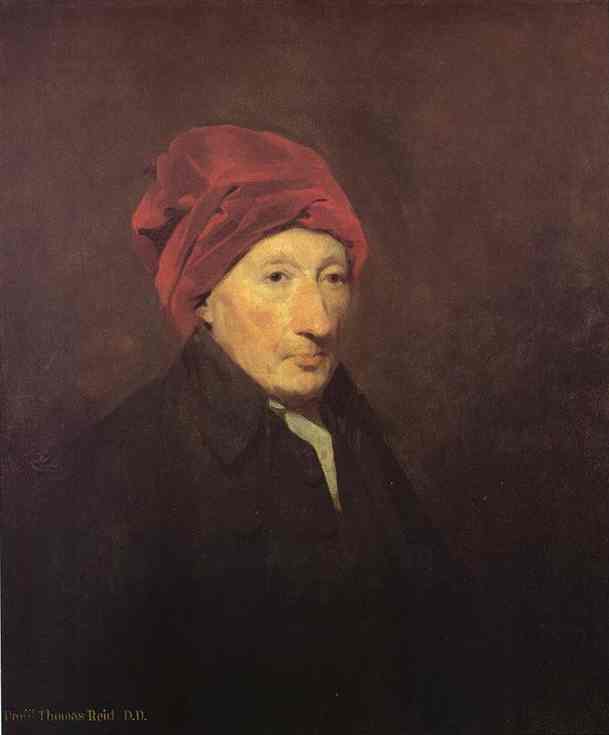
Thomas Reid
生い立ち・生涯
トマス・リード:啓蒙時代の哲学者
トマス・リード(Thomas Reid)は、18世紀スコットランドの哲学者であり、その生涯は啓蒙時代の思想の中で際立った存在でした。
若き日のスコットランドでの生い立ち
リードは1710年4月26日にスコットランドのストラスブリッジで生まれました。
彼の家族は地元の牧師であり、彼は幼少期から宗教的な環境で育ちました。
リードは若い頃から知的好奇心に満ち、地元の学校で教育を受けました。
教育と神学への道
若い頃から学問に情熱を燃やしていたリードは、エディンバラ大学で神学を学びました。
そこで、彼は啓蒙時代の理性主義の影響を受け、古典的な哲学に深い関心を抱くようになりました。
リードは優れた学生であり、多くの同僚や教授から賞賛されました。
フィロソフィカル・インクエリーとの出会い
リードがフィロソフィカル・インクエリーと出会ったのは、彼の哲学的旅程において重要な転機でした。
この時期、彼はダンカン・フォードと出会い、彼の啓蒙的な哲学的アプローチに感銘を受けました。
フォードの影響の下で、リードは自身の哲学的見解を深めていきました。
知覚と現実の研究
リードは知覚と現実の本質に関する研究に情熱を傾けました。
彼の著書『知覚の原理』(1764年)では、人間の感覚や認識がどのように機能するかについて深く探求しました。
リードは、人間の知識は経験に基づいて形成されるという古典的な経験論に異議を唱え、理性の役割を強調しました。
啓蒙時代の批判者
リードは啓蒙時代の合理主義や経験論に対する厳しい批判者でした。
彼は、人間の理解力や直感によっても現実を理解できると主張しました。
また、リードは人間の普遍的な道徳的感覚や倫理観にも焦点を当て、これらが人間の行動の基盤となると主張しました。
最晩年と遺産
リードは1796年10月7日に没しましたが、彼の哲学的遺産はその後の哲学者に大きな影響を与え続けました。
彼の著書や講義は、啓蒙時代の思想の中で重要な位置を占めています。
リードの哲学は、その時代の新しいアプローチとして、現実の本質や人間の認識能力についての議論を豊かにしました。
Upbringing and Life
Thomas Reid: Enlightenment Philosopher
Thomas Reid was a philosopher from Scotland in the 18th century, and his life stood out as a prominent figure in the thought of the Enlightenment era.
Early Life in Scotland
Reid was born on April 26, 1710, in Strachan, Scotland.
His family was comprised of local clergy, and he grew up in a religious environment from an early age.
Reid was filled with intellectual curiosity from his youth and received education at local schools.
Education and Path to Theology
With a passion for learning from a young age, Reid studied theology at the University of Edinburgh.
There, he was influenced by the rationalism of the Enlightenment and developed a deep interest in classical philosophy.
Reid was an excellent student, earning praise from many colleagues and professors.
Encounter with Philosophical Inquiry
Encountering Philosophical Inquiry marked a significant turning point in Reid’s philosophical journey.
During this period, he met Duncan Ford and was impressed by his Enlightenment philosophical approach.
Under Ford’s influence, Reid deepened his own philosophical views.
Study of Perception and Reality
Reid devoted himself passionately to the study of the essence of perception and reality.
In his work “An Inquiry into the Human Mind” (1764), he deeply explored how human senses and cognition function.
Reid argued against the classical empiricism that human knowledge is formed based solely on experience and emphasized the role of reason.
Critique of the Enlightenment
Reid was a harsh critic of Enlightenment rationalism and empiricism.
He argued that humans can understand reality through their powers of understanding and intuition.
Moreover, Reid focused on humans’ universal moral sense and ethics, asserting that these form the basis of human behavior.
Late Years and Legacy
Reid passed away on October 7, 1796, but his philosophical legacy continued to greatly influence subsequent philosophers.
His writings and lectures hold an important place in the thought of the Enlightenment era.
Reid’s philosophy enriched discussions on the essence of reality and human cognitive abilities as a new approach of his time.
哲学・思想
トマス・リード:啓蒙時代の新たな視点
トマス・リード(Thomas Reid)は18世紀のスコットランド出身の哲学者であり、その業績は啓蒙時代の哲学に革新的な視点をもたらしました。
彼の哲学は、古典的な経験論や合理主義に挑戦し、新しい知識論や認識論の方向性を示しました。
経験と理性の統合
リードの哲学の中心には、経験と理性の統合があります。
彼は、人間の知識が経験に基づくだけでなく、理性や直感によっても形成されると主張しました。
これは啓蒙時代の古典的な経験論に対する挑戦であり、人間の認識能力の多面性を強調するものでした。
知覚の原理
リードの代表的な著作の一つに「知覚の原理」(1764年)があります。
この中で、リードは人間の知覚の仕組みについて探求しました。
彼は五感を通じてのみ現実を認識するという古典的な見解に疑問を投げかけ、直観や理性が知識形成に果たす役割を強調しました。
コモンセンスの信念
リードはコモンセンスの信念にも焦点を当てました。
彼は人間が普遍的な道徳的価値観や真理についての直感を持っていると主張しました。
このコモンセンスの信念は、人間の理性や経験に基づく認識能力だけでなく、直観的な理解にも根ざしているというリードの独自の立場を示しています。
批判と影響
リードの哲学は、当時の啓蒙思想に対する批判的な視点を提供しました。
彼のアイデアは啓蒙時代の他の哲学者や知識人にも影響を与え、彼らの議論に新たな次元を加えました。
特に、リードの経験論や認識論の見解は、後の哲学や心理学の発展に影響を与えました。
終焉と遺産
リードは1796年10月7日に亡くなりましたが、彼の哲学はその後も多くの哲学者や学者によって研究され、議論の的となりました。
彼の著作は啓蒙時代の古典として尊重され、彼のアイデアは現代の知識論や認識論の議論にも影響を与え続けています。
リードの哲学は、経験と理性、直観と知識の統合に関する洞察によって、現代の哲学の重要な一部となっています。
Philosophy and Thought
Thomas Reid: A New Perspective in the Enlightenment Era
Thomas Reid, a philosopher from 18th-century Scotland, brought innovative perspectives to Enlightenment philosophy.
His philosophy challenged classical empiricism and rationalism, indicating new directions in epistemology and metaphysics.
Integration of Experience and Reason
At the core of Reid’s philosophy lies the integration of experience and reason.
He argued that human knowledge is not solely based on experience but also shaped by reason and intuition.
This challenged classical empiricism of the Enlightenment, emphasizing the multifaceted nature of human cognition.
Principles of Perception
One of Reid’s notable works is “An Inquiry into the Human Mind” (1764).
In this work, Reid delved into the mechanisms of human perception.
He questioned the classical view that humans perceive reality only through the five senses, emphasizing the role of intuition and reason in knowledge formation.
Belief in Common Sense
Reid also focused on the belief in common sense.
He asserted that humans possess intuitive beliefs about universal moral values and truths.
This belief in common sense reflects Reid’s unique position, rooted not only in human rationality and empirical knowledge but also in intuitive understanding.
Criticism and Influence
Reid’s philosophy provided a critical perspective on Enlightenment thought at the time.
His ideas influenced other philosophers and intellectuals of the Enlightenment, adding new dimensions to their discussions.
In particular, Reid’s views on empiricism and epistemology influenced the development of later philosophy and psychology.
Demise and Legacy
Reid passed away on October 7, 1796, but his philosophy continued to be studied and debated by many philosophers and scholars.
His writings are respected as classics of the Enlightenment era, and his ideas continue to influence discussions in contemporary epistemology and metaphysics.
Reid’s philosophy has become an essential part of modern philosophy, offering insights into the integration of experience and reason, intuition and knowledge.
特徴
トマス・リード:認識論の革新者
トマス・リード(Thomas Reid)は18世紀のスコットランド出身の哲学者であり、その思想は認識論における新たな視点をもたらしました。
彼の特徴的な思想や業績を見ていきましょう。
経験と理性の統合
リードの最も顕著な特徴の一つは、経験と理性の統合に対する彼のアプローチです。
彼は、古典的な経験論や合理主義に対抗して、経験だけでなく理性も人間の知識形成に重要だと主張しました。
この統合的なアプローチは、啓蒙時代の哲学に新しい視点をもたらしました。
直観とコモンセンスの重要性
リードは、人間の知識や理解における直観とコモンセンスの重要性を強調しました。
彼は、感覚経験や直観的な理解が人間の認識能力に深い影響を与えると信じていました。
この考え方は、彼の認識論における独自の立場を示しています。
知覚の原理
リードは、「知覚の原理」という著作で人間の知覚について深く探求しました。
彼は、五感だけでなく直感や理性も知覚の形成に関与すると論じ、古典的な経験論に挑戦しました。
この著作は、彼の認識論の核心的な概念を明らかにしました。
影響と批判
リードの思想は、当時の哲学界に大きな影響を与えましたが、同時に批判の的ともなりました。
彼の経験と理性の統合や直観の重要性に関する見解は、啓蒙時代の他の哲学者や知識人との議論の的となりました。
しかし、その影響力は彼の死後も続き、彼の思想は後の時代の哲学にも影響を与え続けました。
遺産と今日への継続
リードの思想は、彼の死後も多くの哲学者や学者によって研究され、その遺産は現代の哲学にも影響を与え続けています。
彼の経験と理性の統合や直観の重視は、現代の認識論や心理学の研究においても重要なテーマとなっています。
リードの革新的なアイデアは、今日の哲学における重要な議論の一部として、その影響力を保ち続けています。
Characteristics
Thomas Reid: Innovator in Epistemology
Thomas Reid, a philosopher from 18th-century Scotland, brought forth new perspectives in epistemology.
Let’s explore his distinctive thoughts and achievements.
Integration of Experience and Reason
One of Reid’s most prominent characteristics is his approach to integrating experience and reason.
He argued that, contrary to classical empiricism and rationalism, both experience and reason are crucial for human knowledge formation.
This integrative approach brought a fresh perspective to Enlightenment-era philosophy.
Significance of Intuition and Common Sense
Reid emphasized the importance of intuition and common sense in human knowledge and understanding.
He believed that sensory experience and intuitive understanding profoundly influence human cognition.
This perspective highlights Reid’s unique stance in epistemology.
Principles of Perception
In his work “An Inquiry into the Human Mind,” Reid deeply explored human perception.
He argued that not only the five senses but also intuition and reason play roles in perception, challenging classical empiricism.
This work elucidated the core concepts of his epistemology.
Influence and Criticism
Reid’s ideas had a significant impact on the philosophical landscape of his time but also drew criticism.
His views on integrating experience and reason and emphasizing intuition became subjects of debate among other Enlightenment philosophers and intellectuals.
Nevertheless, his influence persisted after his death, shaping later periods of philosophy.
Legacy and Continuation to Today
Reid’s philosophy continues to be studied by many philosophers and scholars, influencing contemporary philosophy.
His emphasis on integrating experience and reason and valuing intuition remains significant themes in modern epistemology and psychology.
Reid’s innovative ideas remain influential in today’s philosophical discussions, maintaining their relevance in contemporary philosophy.
エピソード
トマス・リードの知性と風変わりな逸話
トマス・リードは知性と革新性に満ちた哲学者であり、その生涯には興味深い逸話が数多く残されています。
彼の独特の思考や風変わりな行動は、彼がどのようにしてその時代における重要な哲学者となったのかを物語っています。
1. 窓からの思索
リードはしばしば窓から外を眺めながら哲学的な問題に思いを巡らせることがありました。
彼の友人たちは、彼が考え事に没頭しているときに窓辺に座り、外の景色を眺めながら新しいアイデアを生み出す様子を見て驚きました。
リード自身も、自然の景色や風景が彼の思考を刺激し、洞察力を深めるのに役立っていたと述べています。
2. 反対者との討論
リードは知性と議論の才能に長けており、彼の意見をめぐっては時に激しい討論が繰り広げられました。
特に彼の経験論や直観主義の立場は、当時の他の哲学者たちとの間で激しい反発を招きました。
しかし、リードは自らの主張をしっかりと守り、合理的な論拠に基づいて相手と議論することで知られています。
3. 思索の夜
リードは夜更けまで哲学的な問題に取り組むことがよくありました。
彼は夜が深まるにつれてより集中力を高め、新たなアイデアや洞察を得ることができたと言われています。
そのため、彼の友人や同僚たちは彼の部屋から夜遅くまで灯りがともっているのをよく見かけたと伝えています。
リード自身も、夜の静けさが彼の思考をより深い次元に導いたと述べています。
4. 自然との調和
リードは自然との調和を大切にしました。
彼は自然の中で散歩をすることや庭園で時間を過ごすことを好み、そこから多くのインスピレーションを得ていました。
彼の哲学は、自然の摂理や秩序に触発され、人間の認識や理解の本質について深く考察する契機となりました。
トマス・リードの逸話には、彼の知性と個性が反映されています。
窓からの思索や夜の哲学的な議論、自然との調和など、彼の生涯は多くの興味深いエピソードで彩られています。
これらの逸話は、彼の思想形成や哲学的アプローチに深い洞察を与え、彼の時代における重要な哲学者としての地位を裏付けています。
Episodes
Thomas Reid: Anecdotes of Intellect and Eccentricity
Thomas Reid was a philosopher filled with intellect and innovation, and his life is adorned with many intriguing anecdotes.
His unique thoughts and eccentric behaviors narrate how he became a prominent philosopher of his time.
- Contemplation by the Window
Reid often pondered philosophical questions while gazing out of the window.
His friends were astonished to see him sitting by the window, engrossed in deep thought, generating new ideas while admiring the scenery outside.
Reid himself mentioned that the natural landscapes stimulated his thoughts and enhanced his insights.
- Debates with Opponents
Reid excelled in intellect and debating skills, often engaging in intense debates over his opinions.
Especially, his positions on empiricism and intuitionism sparked vigorous opposition from other philosophers of his time.
However, Reid firmly defended his assertions, known for engaging in rational arguments based on evidence.
- Nights of Reflection
Reid frequently delved into philosophical problems until late at night.
As the night deepened, he reportedly heightened his concentration, gaining new ideas and insights.
Hence, his friends and colleagues often noticed lights in his room burning late into the night.
Reid himself stated that the quietness of the night led his thoughts to deeper dimensions.
- Harmony with Nature
Reid valued harmony with nature.
He enjoyed taking walks in nature and spending time in gardens, drawing much inspiration from these activities.
His philosophy was inspired by the order and principles of nature, prompting deep contemplation on the essence of human cognition and understanding.
The anecdotes of Thomas Reid reflect his intellect and individuality.
From contemplation by the window to philosophical debates at night and harmony with nature, his life is colored with many intriguing episodes.
These anecdotes provide profound insights into his thought formation and philosophical approach, underscoring his position as a significant philosopher of his era.
リード 常識学派の創始者 「神聖なる本能」『常識の原則に基づく精神の研究』
デイヴィッド・ヒューム(1711年4月26日 – 1776年8月25日)
David Hume (April 26, 1711 – August 25, 1776)
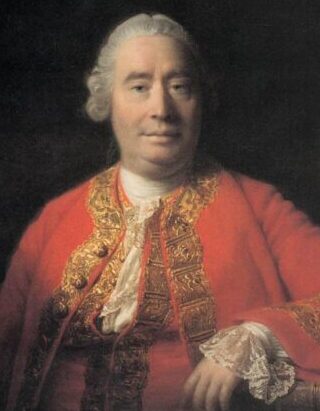
David Hume
生い立ち・生涯
デイヴィッド・ヒュームは、18世紀のスコットランドに生まれた哲学者であり、啓蒙時代の重要な思想家の一人です。
彼は1711年にエディンバラで生まれ、若い頃から知的好奇心に満ちた生活を送りました。
若き日のヒュームは、人生の初期から哲学に興味を持ち、オックスフォード大学で学びましたが、哲学的な道を選びました。
彼の最初の著作である『人間理解論』(1739-1740年)は、大きな反響を呼び、彼の名声を確立しました。
その後、ヒュームはフランスやイタリアを旅し、各地で知識を深めました。
彼の最も有名な著作の一つである『人間の理解の原理』(1748年)は、彼の考え方や哲学的な洞察力を示すものでした。
ヒュームの思想は、自然科学と人間の心理についての独自の視点を提供し、彼の時代のみならず、現代にも多大な影響を与えました。
彼は生涯を通じて知識の追求に励み、1776年にエディンバラで亡くなるまで、その独創的な思想を広め続けました。
Early Life and Career
David Hume, born in 18th-century Scotland, was a philosopher and one of the prominent thinkers of the Enlightenment era.
He was born in 1711 in Edinburgh and led a life filled with intellectual curiosity from a young age.
In his youth, Hume developed an interest in philosophy and chose to pursue it academically, studying at the University of Oxford.
His initial work, “A Treatise of Human Nature” (1739-1740), garnered significant attention and established his reputation.
Subsequently, Hume traveled to France and Italy, enriching his knowledge through various experiences.
One of his most renowned works, “An Enquiry Concerning Human Understanding” (1748), showcased his philosophical insights and perspectives.
Hume’s philosophy offered a unique viewpoint on natural science and human psychology, influencing not only his contemporaries but also leaving a lasting impact on modern thought.
Throughout his life, he remained dedicated to the pursuit of knowledge, spreading his innovative ideas until his passing in 1776 in Edinburgh.
哲学・思想
デイヴィッド・ヒュームは、18世紀のスコットランド出身の哲学者であり、その思想は現代でも広く議論され続けています。
彼の哲学は、主に経験論と懐疑主義に基づいており、その中心には知識や宗教、道徳などの概念があります。
経験論と懐疑主義
ヒュームの経験論は、経験に基づく知識のみが信頼できるものとする立場をとります。
彼は、人間の心は経験からのみ知識を得ることができると主張し、先天的な知識や理性のみによる知識を否定しました。
この考え方は、彼の代表作である『人間理解の原理』において詳細に展開されています。
また、ヒュームは懐疑主義の立場も取ります。
彼は、我々の感覚や理性が常に信頼できるものではないと主張しました。
例えば、因果関係や外界の存在についての知識も、経験に基づくものであり、確実なものではないと考えました。
印象とアイデア
ヒュームは、人間の心には「印象」と「アイデア」という2つの要素があると考えました。
印象とは、経験によって直接得られる感覚や情動のことであり、アイデアとは、印象を元にして心の中で生み出される概念や思考のことです。
習慣と因果関係
彼の中でも特筆すべき考えの一つが、習慣と因果関係の関連性についてです。
ヒュームは、我々が習慣的にある出来事が別の出来事に続くという経験を通じて、因果関係を信じるようになると考えました。
しかし、因果関係そのものを直接的に経験することはできないとし、それはあくまで心の中での習慣に過ぎないと述べました。
宗教と道徳
ヒュームは宗教と道徳についても深く考察しました。
彼は宗教的な信念を経験や理性で論じ、奇跡や神の存在に懐疑的な見解を示しました。
また、道徳に関しても、彼は人間の感情や社会的な規範が道徳的な判断に影響を与えると考え、その起源について詳細に論じました。
影響と評価
ヒュームの思想は、彼の存命中から現代に至るまで大きな影響を与え続けています。
彼の経験論や懐疑主義は、後の哲学者や科学者に多大な影響を与え、特にロシュフォコーの経験論やウィリアム・ジェームズのプラグマティズムに影響を与えました。
彼の考え方は、現代の哲学や心理学の分野においても重要な議論の的となっています。
Early Life and Career
David Hume, a philosopher born in 18th-century Scotland, stands as one of the significant thinkers of the Enlightenment era.
He was born in 1711 in Edinburgh and led a life brimming with intellectual curiosity from a young age.
In his youth, Hume developed an interest in philosophy and pursued it academically, opting for a philosophical path despite studying at the University of Oxford.
His initial work, “A Treatise of Human Nature” (1739-1740), garnered substantial attention and established his reputation.
Subsequently, Hume embarked on travels to France and Italy, expanding his knowledge through various experiences.
One of his most famous works, “An Enquiry Concerning Human Understanding” (1748), showcased his philosophical insights and perspectives.
Hume’s philosophy offered a unique viewpoint on natural science and human psychology, influencing not only his contemporaries but also leaving a lasting impact on modern thought.
Throughout his life, he remained dedicated to the pursuit of knowledge, spreading his innovative ideas until his passing in 1776 in Edinburgh.
特徴
デイヴィッド・ヒュームは、18世紀のスコットランドを代表する哲学者であり、その思想は現代の哲学にも大きな影響を与えています。
彼の特徴的な思想や著作には以下のようなものがあります。
経験論と懐疑主義
ヒュームの思想の中心には、経験論と懐疑主義があります。
彼は、人間の知識や信念はすべて経験に基づいており、先天的な理性による知識を否定しました。
また、彼は懐疑主義者でもあり、我々の感覚や理性が常に信頼できるものではないと考えました。
「印象」と「アイデア」
ヒュームは、人間の心には「印象」と「アイデア」という2つの要素があると考えました。
印象は、経験に基づく直接的な感覚や情動を指し、アイデアは、印象を元にして心の中で形成される概念や思考です。
習慣と因果関係
特筆すべきは、ヒュームの因果関係に関する考え方です。
彼は、我々が習慣的にある出来事が別の出来事に続くという経験を通じて、因果関係を信じるようになると考えました。
しかし、彼は因果関係そのものを直接的に経験することはできないとし、それはあくまで心の中での習慣に過ぎないと述べました。
宗教と道徳
ヒュームは宗教と道徳にも深く関心を持ちました。
彼は宗教的な信念を懐疑的に見ており、奇跡や神の存在に疑問を投げかけました。
また、彼は道徳についても、人間の感情や社会的な規範が道徳的な判断に影響を与えると考え、その起源について探求しました。
影響と評価
ヒュームの思想は、彼の存命中から現代に至るまで大きな影響を与えています。
彼の経験論や懐疑主義は、後の哲学者や科学者に多大な影響を与え、現代の哲学や心理学の分野においても重要な議論の的となっています。
Characteristics
David Hume, a prominent philosopher representing 18th-century Scotland, has significantly influenced modern philosophy with his distinctive ideas and works. Some of his notable characteristics and contributions include:
Empiricism and Skepticism
At the core of Hume’s philosophy lies empiricism and skepticism. He argued that all human knowledge and beliefs stem from experience, rejecting innate knowledge based on reason. Additionally, he embraced skepticism, doubting the reliability of our senses and reason.
Impressions and Ideas
Hume proposed that the human mind comprises two elements: impressions and ideas. Impressions refer to direct sensations or emotions based on experience, while ideas are concepts or thoughts formed in the mind based on impressions.
Habit and Causation
Noteworthy is Hume’s perspective on causation. He believed that through habitual association, we come to believe in causation—seeing one event follow another regularly. However, he argued that causation itself cannot be directly experienced, considering it merely a habit of the mind.
Religion and Morality
Hume held a deep interest in religion and morality, viewing religious beliefs skeptically and questioning miracles and the existence of God. Moreover, he explored the influence of human emotions and societal norms on moral judgments, delving into their origins.
Influence and Evaluation
Hume’s philosophy has wielded significant influence from his lifetime to the present day. His empiricism and skepticism have profoundly impacted later philosophers and scientists, sparking essential debates in contemporary philosophy and psychology.
エピソード
デイヴィッド・ヒュームは、その独特の思想だけでなく、興味深い逸話でも知られています。
信じがたい物語
ヒュームは、スコットランドのエディンバラで生まれ、彼の生涯を通じてさまざまな面白い出来事に巻き込まれました。
その中でも特筆すべきは、彼の著書があまりにも進んだ思想を持っているため、かつて彼が宗教的な反応を受けたことです。
ある時、彼がロンドンの宿泊先で最終稿を書き終えたとき、近くの教会の説教師が「信じられないほどの不道徳な人物」と非難したといいます。
しかし、このような非難にもかかわらず、ヒュームの著作は多くの人々に影響を与え、彼の名声を確立しました。
ヒュームとルソーの交流
また、ヒュームとジャン=ジャック・ルソーの間には興味深い交流がありました。
18世紀後半、彼らはパリで出会い、意見を交換しました。
しかし、彼らの間には理解し合えない点もありました。
ルソーはヒュームの思想を非難し、ヒュームもまたルソーの考えに反対しました。
それでも、彼らの出会いは、その後の哲学や政治思想に影響を与えました。
偉大な友人との交流
ヒュームはまた、偉大な友人との交流でも知られています。
その中でも最も有名なのは、アダム・スミスとの友情です。
スミスは経済学者として知られていますが、ヒュームとの親交は彼の思想形成に大きな影響を与えました。
彼らの手紙のやり取りは、その知的好奇心と友情の証しとして、後世に残されています。
逸話の継続
これらの逸話は、ヒュームの人間性や彼の時代における影響を理解する上で重要です。
彼の生涯と思想は、多くの人々にとって興味深い題材であり、彼の逸話は彼の個性や時代背景をより深く理解する手助けとなります。
Anecdotes
Unbelievable Tales
David Hume, renowned not only for his unique philosophy but also for intriguing anecdotes, had a life peppered with fascinating incidents.
Incredible Narratives
Hume, born in Edinburgh, Scotland, found himself entangled in various captivating events throughout his life. One particularly notable incident occurred due to the advanced nature of his writings, leading to religious backlash. It’s said that during one instance, upon completing his final manuscript at a London inn, a nearby preacher denounced him as an “unbelievably immoral individual.” Despite such criticisms, Hume’s works resonated with many, establishing his reputation.
Interactions with Rousseau
Moreover, Hume had fascinating interactions with Jean-Jacques Rousseau. In the late 18th century, they met in Paris and exchanged ideas, albeit with points of disagreement. Rousseau criticized Hume’s philosophy, and in turn, Hume opposed Rousseau’s ideas. Nonetheless, their encounter left an indelible mark on subsequent philosophy and political thought.
Association with Great Friends
Hume was also known for his associations with illustrious friends, most notably his friendship with Adam Smith. While Smith is renowned as an economist, his bond with Hume significantly influenced his intellectual development. Their correspondence stands as a testament to their intellectual curiosity and enduring friendship, preserved for posterity.
Continuation of Anecdotes
These anecdotes are crucial for understanding Hume’s humanity and his influence in his era. His life and philosophy remain intriguing subjects for many, and his anecdotes serve as windows into his personality and the historical context.
ヒュームの哲学 経験論・懐疑論の全貌『英国史』と『人間本性論』
ジャン・ル・ロン・ダランベール(1717年11月16日 – 1783年10月29日)
Jean le Rond d’Alembert (November 16, 1717 – October 29, 1783)
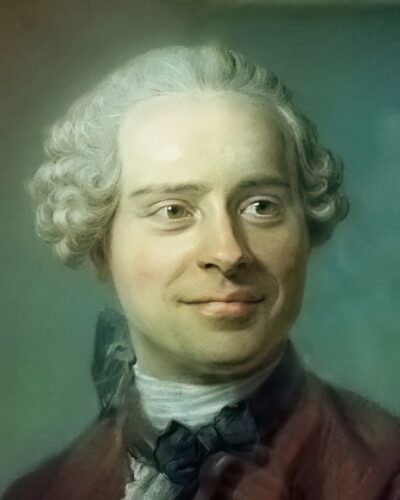
Jean Le Rond d’Alembert
生い立ち・生涯
ジャン・ル・ロン・ダランベールの生涯
ジャン・ル・ロン・ダランベールは、18世紀フランスの傑出した数学者、天文学者、そして哲学者として知られています。
彼の生涯は、卓越した才能と情熱に満ちた驚くべき旅路であり、その貢献は時代を超えて称賛されています。
幼少期と教育
ダランベールは1717年11月16日、パリで生まれました。
幼少期から数学に興味を持ち、早くからその才能を示しました。
父親であるフランスの科学者であるジャン・ダランベールの影響を受け、彼の興味は数学と天文学に向かいました。
学問の道へ
若い頃、ダランベールはパリのサン=バルテルミー・リセに入学し、そこで数学の基礎を学びました。
その後、パリ天文台で働きながら、天文学と数学の研究を深めました。
彼の研究は広く注目され、若い天才としての評判を確立しました。
貢献と業績
ダランベールの業績の中でも最も注目されるのは、天文学と数学の分野での革新的な貢献です。
彼は複数の天文学的現象を観測し、観測データを用いて理論を発展させました。
その成果は、彼の時代における天文学の進歩に大きな影響を与えました。
知識の伝播と晩年
ダランベールは優れた教育者でもあり、数学や天文学の普及に貢献しました。
彼の著作や講義は広く読まれ、多くの学生や研究者に影響を与えました。
晩年には偉大な学者としての地位を確立し、1783年10月29日に亡くなるまでその地位を保ちました。
終わりに
ジャン・ル・ロン・ダランベールの生涯は、数学と天文学の分野における革新的な業績と知識の普及に捧げられました。
彼の貢献は、現代の科学者や学生にも尊敬され、その功績は時代を超えて輝き続けています。
Life and Legacy of Jean le Rond d’Alembert
Jean le Rond d’Alembert is renowned as an eminent mathematician, astronomer, and philosopher of 18th-century France.
His life was a remarkable journey filled with exceptional talent and passion, and his contributions continue to be admired across generations.
Early Life and Education
D’Alembert was born on November 16, 1717, in Paris.
From a young age, he showed a keen interest in mathematics and displayed his talent early on.
Influenced by his father, Jean d’Alembert, a French scientist, his interests turned toward mathematics and astronomy.
Academic Pursuits
During his youth, d’Alembert enrolled at the Collège des Quatre-Nations in Paris, where he studied the foundations of mathematics.
Subsequently, while working at the Paris Observatory, he delved deeper into the study of astronomy and mathematics.
His research garnered wide attention, establishing his reputation as a young prodigy.
Contributions and Achievements
Among d’Alembert’s notable achievements are his groundbreaking contributions to the fields of astronomy and mathematics.
He observed various astronomical phenomena and developed theories based on observational data.
His accomplishments had a significant impact on the advancement of astronomy during his time.
Dissemination of Knowledge and Later Years
D’Alembert was also a distinguished educator, contributing to the dissemination of mathematics and astronomy.
His writings and lectures were widely read and influenced many students and researchers.
In his later years, he solidified his position as a great scholar, maintaining his stature until his passing on October 29, 1783.
Conclusion
The life of Jean le Rond d’Alembert was dedicated to innovative achievements in the fields of mathematics and astronomy, as well as the dissemination of knowledge.
His contributions are respected by modern scientists and students alike, continuing to shine brightly across the ages.
哲学・思想
ジャン・ル・ロン・ダランベールの哲学と思想
ジャン・ル・ロン・ダランベールは、18世紀におけるフランスの数学者、天文学者として知られる一方で、彼の思想と哲学についても注目される存在でした。
彼の哲学は、科学と宗教、自然と人間の関係に関する洞察に焦点を当てています。
理性と宗教
ダランベールは理性主義の立場を取り、宗教に対しては懐疑的な姿勢を示しました。
彼は、神学的な信念や奇跡を裏付ける証拠が不十分であると考え、自然の法則に基づいた観察と理性による知識のみを信頼しました。
そのため、彼の哲学は神秘主義や宗教的伝統とは対照的であり、合理性と科学の重要性を強調しました。
数学と自然の秩序
ダランベールの哲学は、数学的な観点から自然の秩序と規則性についての理解に深く根ざしています。
彼は、宇宙や自然現象が数学的な法則に従って動作するという信念を持ち、その法則を観察し数学的にモデル化することで自然の秘密を解き明かそうとしました。
彼の研究は、天文学や物理学の分野に革新的な理論をもたらし、科学的方法論の発展に貢献しました。
人間の位置と自然観
ダランベールの哲学は、人間と自然の関係についての洞察にも焦点を当てています。
彼は人間を自然の一部として捉え、人間の行動や思考も自然の法則に従っていると考えました。
この観点から、彼は人間の行動や社会的な構造を科学的な方法で説明しようとしました。
彼の自然観は、人間中心主義や神の介入という従来の観念に挑戦し、自然の秩序と人間の統一性を強調しました。
啓蒙思想と社会改革
ダランベールの哲学は、当時の啓蒙思想と密接に結びついています。
彼は啓蒙主義の理念に基づき、合理性と知識の普及が社会の進歩と改革につながると信じました。
彼の思想は、教育の重要性や人々の理性的な考え方の促進を強調し、社会の発展に向けた指針となりました。
結びに
ジャン・ル・ロン・ダランベールの哲学は、理性主義と科学的方法論の観点から自然と人間の関係を探求し、啓蒙思想の理念と社会改革の促進に貢献しました。
彼の思想は、科学と宗教、自然と人間の関係における新たな理解をもたらし、現代の科学的思考と社会的進歩の基盤となっています。
Philosophy and Thought
The Philosophy of Jean le Rond d’Alembert
Jean le Rond d’Alembert, known as a mathematician and astronomer in 18th-century France, also garnered attention for his philosophical ideas.
His philosophy focused on insights into the relationship between science and religion, as well as nature and humanity.
Reason and Religion
D’Alembert adopted a rationalist stance and exhibited skepticism towards religion.
He believed that theological beliefs and miracles lacked sufficient evidence, relying instead on observation based on natural laws and knowledge derived from reason.
Thus, his philosophy contrasted with mysticism and religious traditions, emphasizing the importance of rationality and science.
Mathematics and the Order of Nature
D’Alembert’s philosophy was deeply rooted in understanding the order and regularity of nature from a mathematical perspective.
He held the belief that the universe and natural phenomena operate according to mathematical laws, seeking to unravel the secrets of nature by observing these laws and mathematically modeling them.
His research brought innovative theories to the fields of astronomy and physics, contributing to the development of scientific methodology.
Human Position and View of Nature
D’Alembert’s philosophy also focused on insights into the relationship between humans and nature.
He viewed humans as part of nature, believing that human actions and thoughts also follow natural laws.
From this perspective, he sought to explain human behavior and social structures through scientific methods.
His view of nature challenged conventional notions of anthropocentrism and divine intervention, emphasizing the unity of natural order and humanity.
Enlightenment Thought and Social Reform
D’Alembert’s philosophy was closely linked to the Enlightenment thought of his time.
He believed in the principles of the Enlightenment, advocating that the dissemination of rationality and knowledge leads to social progress and reform.
His ideas emphasized the importance of education and the promotion of rational thinking among people, serving as a guideline for social development.
Conclusion
The philosophy of Jean le Rond d’Alembert explored the relationship between nature and humanity from the perspectives of rationalism and scientific methodology, contributing to the promotion of Enlightenment ideals and social reform.
His ideas brought about a new understanding of the relationship between science and religion, nature and humanity, laying the foundation for modern scientific thinking and social progress.
特徴
ジャン・ル・ロン・ダランベールの特徴
ジャン・ル・ロン・ダランベールは、18世紀フランスの数学者、物理学者、そして哲学者として、その時代を代表する人物の一人です。
彼の業績や思想には、いくつかの特徴があります。
多彩な才能と多方面への貢献
彼の最も顕著な特徴の一つは、多彩な才能と多方面への貢献です。
彼は数学において新しい理論を開発し、天文学において重要な発見を行いました。さらに、物理学や地球科学、そして哲学にも貢献しました。
その幅広い関心と研究領域は、彼の時代を超えて多大な影響を与えました。
科学的方法論の重視
ダランベールは、科学的方法論の重要性を強く信じていました。
彼は観察と実験に基づいたデータの収集と分析を重視し、その結果に基づいて理論を構築しました。
彼の科学的アプローチは、当時の科学界に革新的なアイデアをもたらし、現代科学の発展にも影響を与えました。
啓蒙思想の信奉
ダランベールは、啓蒙思想の信奉者でした。
彼は理性と知識の普及が社会の進歩と改革につながると信じ、教育の普及や合理的な政策の推進を支持しました。
彼の啓蒙主義の理念は、時代の思想や社会に大きな影響を与えました。
著作の多様性と影響力
ダランベールの著作は多岐にわたり、その影響力は広範囲に及びます。
数学や天文学の分野では、彼の著作が新たな理論や発見をもたらし、物理学や地球科学の分野では、彼の研究が科学の進歩に寄与しました。
また、彼の哲学的な著作は、当時の思想界に新たな視点を提供し、後世の哲学者や科学者に影響を与えました。
継続的な評価と称賛
彼の業績や思想は、その後の時代でも高く評価されています。
彼の科学的方法論や啓蒙思想の理念は、現代の科学と社会の発展においても重要な示唆を与えています。
彼の功績は、歴史的にも現代的にも称賛され、彼の名前は科学と哲学の偉大なる人物の一人として記憶されています。
Philosophy and Thought
The Philosophy of Jean le Rond d’Alembert
Jean le Rond d’Alembert, known as a mathematician and astronomer in 18th-century France, also garnered attention for his philosophical ideas.
His philosophy focused on insights into the relationship between science and religion, as well as nature and humanity.
Reason and Religion
D’Alembert adopted a rationalist stance and exhibited skepticism towards religion.
He believed that theological beliefs and miracles lacked sufficient evidence, relying instead on observation based on natural laws and knowledge derived from reason.
Thus, his philosophy contrasted with mysticism and religious traditions, emphasizing the importance of rationality and science.
Mathematics and the Order of Nature
D’Alembert’s philosophy was deeply rooted in understanding the order and regularity of nature from a mathematical perspective.
He held the belief that the universe and natural phenomena operate according to mathematical laws, seeking to unravel the secrets of nature by observing these laws and mathematically modeling them.
His research brought innovative theories to the fields of astronomy and physics, contributing to the development of scientific methodology.
Human Position and View of Nature
D’Alembert’s philosophy also focused on insights into the relationship between humans and nature.
He viewed humans as part of nature, believing that human actions and thoughts also follow natural laws.
From this perspective, he sought to explain human behavior and social structures through scientific methods.
His view of nature challenged conventional notions of anthropocentrism and divine intervention, emphasizing the unity of natural order and humanity.
Enlightenment Thought and Social Reform
D’Alembert’s philosophy was closely linked to the Enlightenment thought of his time.
He believed in the principles of the Enlightenment, advocating that the dissemination of rationality and knowledge leads to social progress and reform.
His ideas emphasized the importance of education and the promotion of rational thinking among people, serving as a guideline for social development.
Conclusion
The philosophy of Jean le Rond d’Alembert explored the relationship between nature and humanity from the perspectives of rationalism and scientific methodology, contributing to the promotion of Enlightenment ideals and social reform.
His ideas brought about a new understanding of the relationship between science and religion, nature and humanity, laying the foundation for modern scientific thinking and social progress.
エピソード
ジャン・ル・ロン・ダランベールの逸話
天文学の奇跡
ダランベールが天文学の研究を行っていた頃、ある興味深い逸話が残されています。
彼が天体観測を行っている最中、夜空に新しい彗星が現れたという報告がありました。
ダランベールはこれを聞きつけると、ただちにその彗星の観測と解析を開始しました。
彼の的確な観測と分析により、その彗星の軌道が確立され、それが周期的に現れることが明らかになりました。
これは当時の天文学界にとって重要な発見であり、ダランベールの名声を一層高めることとなりました。
理性と実験の結婚
ダランベールは理論的な洞察と実験の結合によって、科学の進歩に貢献しました。
彼の実験室での研究は、理論的な予測と実際の結果の一致を証明し、科学的方法論の重要性を強調しました。
ある時、彼は液体の振動に関する研究を行い、その振動の周期がどのように影響を受けるかを詳細に調査しました。
その結果、彼は振動の法則を見出し、この研究は後の音響学や振動工学の基礎となりました。
啓蒙の情熱
ダランベールは啓蒙思想の熱心な支持者であり、その理念を実践しました。
彼は教育の普及や科学の普及に努め、知識の普及が社会の発展と改革につながると信じていました。
ある時、彼は若い研究者たちに科学的探求の重要性を説く講演を行い、彼らに知識を求める情熱を掻き立てました。
彼の啓蒙思想への情熱は、彼の時代だけでなく、現代にも影響を与えています。
人間味あふれる一面
ダランベールは優れた科学者であると同時に、人間味あふれる一面も持っていました。
彼は研究室で働く同僚や助手たちと親しく交流し、彼らの意見やアイデアを尊重しました。
ある日、彼は研究室での実験中に間違いを comitter、その間違いを発見した助手に感謝の言葉を贈りました。
ダランベールは優れた科学者であると同時に、人間味あふれる一面も持っていました。
彼は研究室で働く同僚や助手たちと親しく交流し、彼らの意見やアイデアを尊重しました。
ある日、彼は研究室での実験中に間違いを comitter、その間違いを発見した助手に感謝の言葉を贈りました。
彼の謙虚さと人間味あふれる態度は、彼の周りの人々に多くの感銘を与えました。
Episodes
Anecdotes of Jean le Rond d’Alembert
Miracles of Astronomy
During his studies in astronomy, an intriguing anecdote is recounted about Jean le Rond d’Alembert.
While conducting celestial observations, news arrived of a new comet appearing in the night sky.
Upon hearing this, d’Alembert immediately commenced observing and analyzing the comet.
Through his precise observations and analysis, the comet’s orbit was established, revealing its periodic appearances.
This was a significant discovery in the astronomical community at the time, further elevating d’Alembert’s reputation.
Marriage of Reason and Experimentation
D’Alembert contributed to the advancement of science through the synthesis of theoretical insight and experimental rigor.
His laboratory research validated theoretical predictions with practical results, emphasizing the importance of scientific methodology.
At one point, he conducted studies on liquid vibrations, meticulously investigating how their oscillations were influenced.
As a result, he discovered laws governing vibrations, laying the foundation for later studies in acoustics and vibration engineering.
Passion for Enlightenment
D’Alembert was a fervent supporter of Enlightenment ideals, actively embodying its principles.
He advocated for widespread education and the dissemination of scientific knowledge, believing that spreading knowledge would lead to societal development and reform.
On occasion, he delivered lectures to young researchers, inspiring them with his passion for scientific inquiry.
His enthusiasm for Enlightenment ideals continues to influence not only his era but also the present day.
Humanistic Side
Alongside his role as a distinguished scientist, d’Alembert possessed a compassionate human side.
He fostered close relationships with colleagues and assistants in the laboratory, respecting their opinions and ideas.
One day, while conducting experiments, he acknowledged an error discovered by an assistant and expressed gratitude.
D’Alembert’s humility and humanistic approach left a profound impression on those around him.
ジャン=ジャック・ルソー(1712年6月28日 – 1778年7月2日)
Jean-Jacques Rousseau (June 28, 1712 – July 2, 1778)
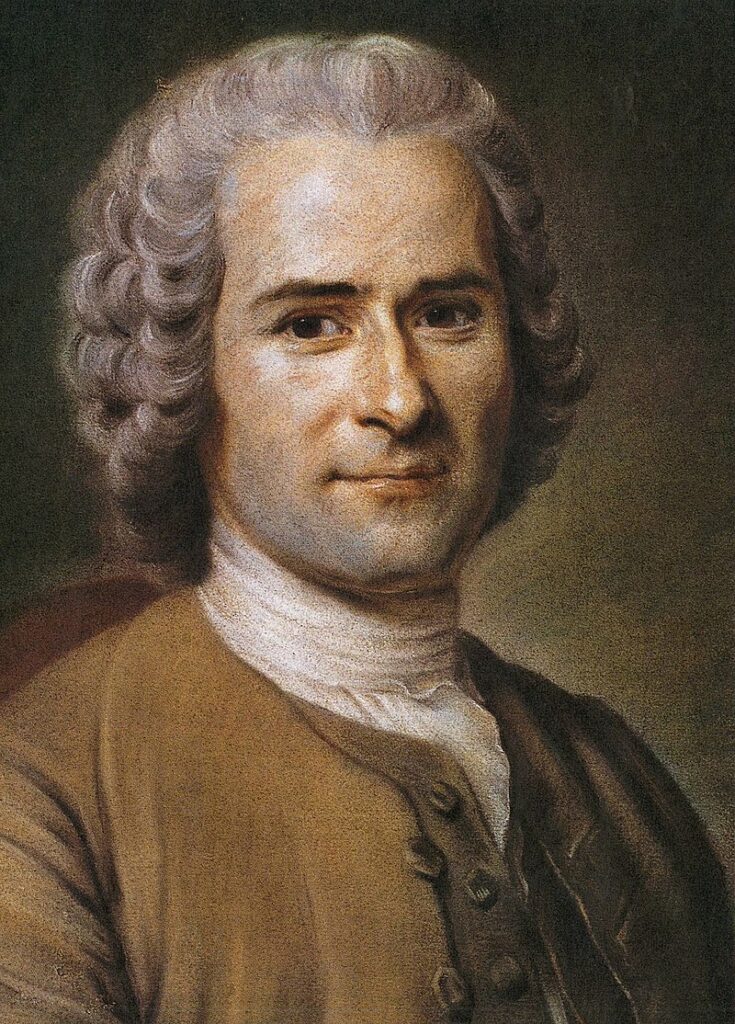
Portrait of Rousseau
生い立ち・生涯
ジャン=ジャック・ルソーの生い立ちと生涯
幼少期から青年期への歩み
ジャン=ジャック・ルソーは1712年6月28日、ジュネーヴで生まれました。
幼少期は母親の死や父親の放蕩によって不安定な環境で過ごしましたが、彼の知的好奇心と鋭い洞察力は早くから顕著でした。
16歳でジュネーヴを離れ、放浪生活を始め、多くの経験を積みました。
文筆活動と知識の獲得
若い頃からルソーは執筆活動を行い、音楽や科学にも興味を示しました。
1735年には、パリで書店員として働きながら、知識を深める機会を得ました。
彼は様々な分野の本を読み漁り、その知識は後の著作に影響を与えることとなります。
哲学と社会批判
ルソーは哲学的思索に没頭し、社会や政治の問題に深い関心を寄せました。
1749年、彼は『不平等の起源と基礎』を発表し、私有財産制度と社会不平等についての批判的見解を示しました。
その後、『社会契約論』では、人々が自然に持つ権利と政府の正当性について探求しました。
文学と教育の提唱
ルソーは文学の分野でも傑出した業績を残しました。
彼の小説『新エロイーズ』や『エミール、あるいは教育』は、個人の自由と感情の重要性に焦点を当て、当時の社会に大きな影響を与えました。
また、教育についての独自の理論を展開し、子どもの自然な成長を尊重する必要性を説きました。
最晩年と遺産
晩年のルソーは疎外感や迫害に苦しみましたが、彼の思想は多くの人々に影響を与え続けました。
1778年7月2日、彼はパリで亡くなりましたが、彼の著作や思想は今日でも多くの人々に愛され、彼の遺産は哲学や政治思想に大きな足跡を残しています。
Early Life and Biography
The Journey from Childhood to Youth
Jean-Jacques Rousseau was born on June 28, 1712, in Geneva. Despite the unstable environment caused by his mother’s death and his father’s recklessness, his intellectual curiosity and sharp insight were evident from an early age. At the age of 16, he left Geneva and embarked on a wandering life, gaining diverse experiences.
Literary Pursuits and Acquisition of Knowledge
From a young age, Rousseau engaged in writing and also showed interest in music and science. In 1735, while working as a bookseller in Paris, he had the opportunity to deepen his knowledge. He voraciously read books from various fields, which later influenced his writings.
Philosophy and Social Critique
Rousseau immersed himself in philosophical contemplation and took a keen interest in social and political issues. In 1749, he published “Discourse on the Origin and Basis of Inequality Among Men,” offering critical insights into the system of private property and social inequality. Later, in “The Social Contract,” he explored the natural rights of people and the legitimacy of government.
Advocacy for Literature and Education
Rousseau also made remarkable literary contributions. His novels “Julie, or the New Heloise” and “Emile, or On Education” focused on individual freedom and the importance of emotions, significantly impacting society at the time. Additionally, he developed his unique theory on education, emphasizing the necessity of respecting a child’s natural development.
Final Years and Legacy
In his later years, Rousseau suffered from alienation and persecution, yet his ideas continued to influence many. He passed away on July 2, 1778, in Paris, but his works and philosophy are still beloved by many today, leaving a significant footprint in philosophy and political thought.

Rousseau’s Birthplace
哲学・思想
ジャン=ジャック・ルソーの哲学・思想
自然の善性と社会不平等
ジャン=ジャック・ルソー(1712年6月28日 – 1778年7月2日)は、18世紀フランスの哲学者・思想家であり、その思想は多くの人々に大きな影響を与えました。
ルソーの哲学の中心には、「自然の善性」と「社会不平等の起源」に関する考察があります。
彼は人間が本来持つ善性を信じ、私有財産や社会的階級制度によってもたらされる不平等を問題視しました。
社会契約論と市民の権利
彼の最も有名な著作である『社会契約論』(1762年)では、ルソーは人々が自然状態から政治的社会を形成するプロセスを論じました。
この社会契約によって個人は「全体意志」に服従することで自由と平等を保障し、個人の権利と義務を調和させると考えました。
また、政府の役割は個人の自由と幸福を守ることにあり、人々の自然な権利を尊重すべきだと主張しました。
自然と文明の対立
ルソーは自然の状態と文明社会の対立を探求しました。
彼は文明が人間を堕落させ、自然との調和を失わせると考えました。
特に私有財産制度や社会的階級制度を批判し、それらが人々の本来の善性を蝕むと主張しました。
彼は自然の状態を理想化し、文明の進歩が人間の心を腐敗させると警告しました。
教育と個人の成長
ルソーは教育についても独自の理論を提唱しました。
彼の著書『エミール、あるいは教育』(1762年)では、自然な成長と個人の自己実現を重視しました。
彼は子どもが自らの経験から学び、自己表現することが重要であると考え、伝統的な教育制度に疑問を投げかけました。
彼の教育理論は個人の自由と尊厳を尊重し、教育の目的は個人の幸福と自己実現にあると論じました。
社会改革と政治的影響
ルソーの思想はフランス革命や他の社会運動に大きな影響を与えました。
彼の理念は自由と平等、民主主義の原則に基づく新しい社会秩序の構築を志向しました。
彼の批判的な見解は多くの人々の心を捉え、彼の死後も彼の思想は継承され、時代を超えて多くの人々に影響を与え続けています。
Philosophy and Thought
Jean-Jacques Rousseau’s Philosophy and Thought
Natural Goodness and Social Inequality
Jean-Jacques Rousseau (June 28, 1712 – July 2, 1778) was an 18th-century French philosopher and thinker whose ideas profoundly influenced many.
At the core of Rousseau’s philosophy are his reflections on “natural goodness” and “the origins of social inequality.”
He believed in the inherent goodness of humanity and questioned the inequalities brought about by private property and social class systems.
The Social Contract and Rights of Citizens
In his most famous work, “The Social Contract” (1762), Rousseau discussed the process by which people form political societies from a state of nature.
Through this social contract, individuals were to guarantee freedom and equality by submitting to the “general will,” harmonizing individual rights and duties.
He argued that the role of government should be to safeguard individual freedom and happiness, respecting people’s natural rights.
Conflict between Nature and Civilization
Rousseau explored the conflict between the state of nature and civilized society.
He believed that civilization corrupted humans and disrupted harmony with nature.
Particularly critical of the system of private property and social class, he argued that they corroded humanity’s innate goodness.
He idealized the state of nature and warned that progress in civilization would corrupt human hearts.
Education and Personal Growth
Rousseau also advocated for his own theory of education.
In his work “Emile, or On Education” (1762), he emphasized natural development and individual self-realization.
He believed that children should learn and express themselves from their own experiences, challenging traditional education systems.
His educational theory respected individual freedom and dignity, arguing that the purpose of education is personal happiness and self-realization.
Social Reform and Political Influence
Rousseau’s ideas had a significant impact on the French Revolution and other social movements.
His ideals aimed to establish a new social order based on the principles of freedom, equality, and democracy.
His critical views resonated with many, and even after his death, his thoughts were inherited, continuing to influence people across generations.
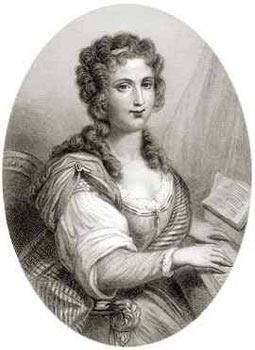
Madame d’Épinay: Rousseau’s Patron and Brief Lover
特徴
ジャン=ジャック・ルソーの特徴
自然への信頼と人間性の善性
ジャン=ジャック・ルソーは、18世紀フランスの思想家であり、その特徴的な思想は多くの人々に大きな影響を与えました。
彼の最も顕著な特徴の1つは、自然への信頼と人間性の善性への信念です。
彼は人間が生まれながらにして善良であると信じ、社会的な制度がこの善性を蝕むと考えました。
社会契約と全体意志の概念
ルソーの思想の中心には、「社会契約」と「全体意志」の概念があります。
彼は『社会契約論』で、人々が自然状態から政治的な組織を形成する際に、お互いに合意する契約を結ぶという考えを提示しました。
そして、この契約によって形成される政治体制は、個人の権利と義務を調和させる「全体意志」に基づくべきだと主張しました。
教育論と自己実現
ルソーは教育についても独自の見解を持っており、その特徴は自己実現の重要性にあります。
彼は教育の目的を、個人が自己を発見し、成長し、自己実現することと考えました。
そのため、伝統的な教育制度に疑問を投げかけ、子どもが自らの興味や好奇心に従って学び、発展することが重要だと説きました。
社会的不平等と革命的精神
ルソーは社会的不平等や階級制度を強く批判しました。
彼は私有財産や社会的地位によってもたらされる不平等を問題視し、それが人間の本質的な善性を損なうと考えました。
そのため、彼の思想は革命的な精神を持ち、新しい社会秩序の構築を志向しました。
影響と継承
ルソーの思想は、フランス革命や他の社会運動に大きな影響を与えました。
彼の理念は自由と平等、民主主義の原則に基づく新しい社会秩序の構築を志向しました。
彼の死後も彼の思想は継承され、時代を超えて多くの人々に影響を与え続けています。
Characteristics
The Characteristics of Jean-Jacques Rousseau
Trust in Nature and the Goodness of Humanity
Jean-Jacques Rousseau, an 18th-century French philosopher, had distinctive ideas that greatly influenced many people.
One of his most notable characteristics was his trust in nature and belief in the innate goodness of humanity.
He believed that humans are inherently good and that social institutions corrupt this goodness.
The Concept of Social Contract and General Will
At the core of Rousseau’s philosophy are the concepts of the “social contract” and the “general will.”
In his work “The Social Contract,” he proposed the idea that people form agreements with each other when organizing themselves politically from a state of nature.
He argued that political systems formed through this contract should be based on the “general will,” which harmonizes individual rights and duties.
Educational Theory and Self-Realization
Rousseau had unique views on education, emphasizing the importance of self-realization.
He believed that education should enable individuals to discover, grow, and achieve self-realization.
Thus, he questioned traditional educational systems and advocated for children to learn and develop according to their interests and curiosity.
Social Inequality and Revolutionary Spirit
Rousseau strongly criticized social inequality and class systems.
He viewed inequalities caused by private property and social status as detrimental to human goodness.
Therefore, his philosophy embraced a revolutionary spirit, aspiring to build a new social order based on principles of freedom, equality, and democracy.
Influence and Legacy
Rousseau’s ideas greatly influenced the French Revolution and other social movements.
His ideals aimed at establishing a new social order based on principles of freedom, equality, and democracy.
Even after his death, his thoughts continue to be inherited, influencing many people across generations.

The Estate where Madame de Warens Lived from 1735 to 1736
エピソード
ジャン=ジャック・ルソーの逸話
孤独な哲学者の日常
ジャン=ジャック・ルソーは、その哲学的な著作とは裏腹に、多くの逸話に彩られた人生を送りました。
彼は孤独を好み、日常生活での独特な行動や瞬間が後世に語り継がれています。
時計の中のムシ
ルソーはある日、時計修理人に持ち込んだ時計を取り戻しに行きました。
その時、時計の中に小さな虫が入り込んでいるのを見つけ、ルソーは驚きました。
しかし、彼はその虫を優しく取り除いて、時計を修理人に返しました。
この出来事は、ルソーの人間愛や優しさを示す逸話として語り継がれました。
奥様のひらめき
ある日、ルソーの奥様が彼の机の引き出しの奥深くに何かを見つけました。
それは彼の未発表の重要な著作の草稿でした。
ルソーはその草稿を忘れてしまっていたのですが、奥様の偶然のひらめきが、後に彼の著作の保存に繋がりました。
哲学者の不器用さ
ルソーは哲学者としての顔とは裏腹に、社交的な場面では不器用な一面もありました。
彼は社交界での軽蔑や攻撃に耐えかね、しばしば孤立した生活を選びました。
そのため、彼の周囲には賞賛と非難が入り交じる人物としてのイメージが残されています。
食卓での辛口批評
ルソーは食事の席でも辛口の批評を行うことで知られていました。
ある日、友人たちとの食事の席で出された料理に対して、彼は辛辣な意見を述べたといいます。
その言葉は当時の社交界に響き渡り、彼の名声をより広めることとなりました。
自然と共に生きる哲学者
ルソーは自然との調和を求め、孤独な自然の中での生活を好みました。
彼はしばしば自然の中で散歩をし、その中で自身の哲学的考えを練り上げました。
その姿勢は後のロマン主義の思想にも影響を与えました。
Episodes
Anecdotes of Jean-Jacques Rousseau
The Daily Life of a Solitary Philosopher
Contrary to his philosophical works, Jean-Jacques Rousseau led a life adorned with many anecdotes.
Preferring solitude, he left behind unique behaviors and moments from his daily life that have been passed down through generations.
The Bug in the Clock
One day, Rousseau went to retrieve a clock he had taken to a watchmaker for repair.
To his surprise, he found a small bug inside the clock.
However, he gently removed the bug and returned the clock to the repairman.
This incident became an anecdote illustrating Rousseau’s compassion and kindness.
Madame’s Discovery
One day, Rousseau’s wife found something deep inside his desk drawer.
It was the manuscript of an important unpublished work.
Rousseau had forgotten about the manuscript, but his wife’s chance discovery led to the preservation of his writings.
The Philosopher’s Social Awkwardness
Despite being a philosopher, Rousseau displayed social awkwardness in social settings.
Unable to withstand contempt and attacks in social circles, he often chose a solitary life.
As a result, he left behind an image of a figure mixed with both admiration and criticism.
Blunt Criticism at the Dining Table
Rousseau was known for his blunt criticism even at the dining table.
It is said that one day, he expressed harsh opinions about a dish served during a meal with friends.
His words resonated in the social circles of the time, further spreading his fame.
Living in Harmony with Nature
Rousseau sought harmony with nature and preferred a solitary life amidst nature’s embrace.
He often took walks in nature, refining his philosophical thoughts amid its tranquility.
His attitude towards nature influenced later Romanticist philosophies.
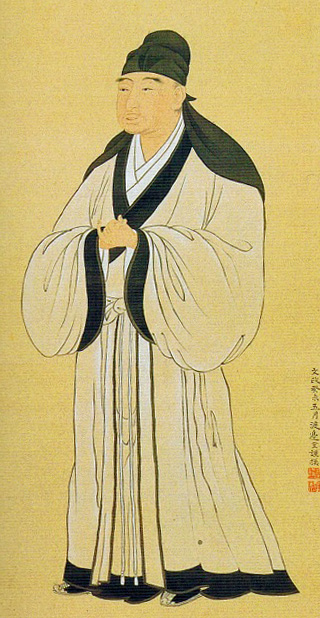
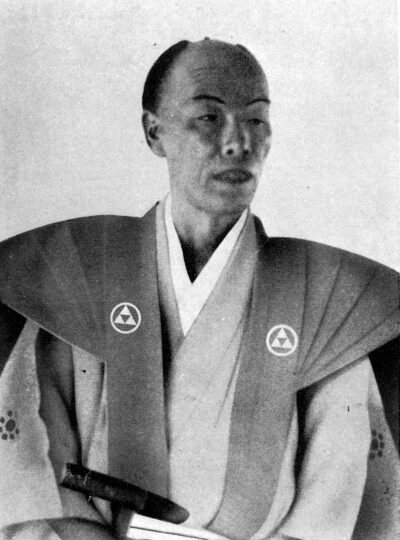
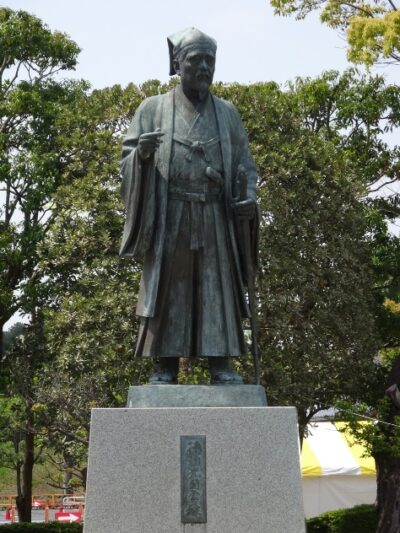
Warning: Undefined variable $comment_form_sns_tags in /home/ktsky/philosophy-kayak.com/public_html/wp-content/themes/shaper/comments.php on line 27